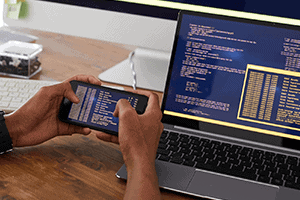Mobile app testing has become strategic in delivering high-quality applications, especially in the context of Android fragmentation. With a vast array of devices, screen sizes, and operating system versions, ensuring consistent performance and user experience can be challenging. This blog explores effective strategies to optimize mobile app testing, focusing on the unique challenges posed by Android fragmentation.
of Android fragmentation. With a vast array of devices, screen sizes, and operating system versions, ensuring consistent performance and user experience can be challenging. This blog explores effective strategies to optimize mobile app testing, focusing on the unique challenges posed by Android fragmentation.
What is Android Fragmentation
Android fragmentation refers to the diversity of devices and operating system versions that run on the Android platform. As of 2024, there are over 24,000 distinct Android devices available globally, each with different specifications and capabilities. This diversity complicates the testing process because an app that performs well on one device may not function optimally on another. According to recent statistics, approximately 70% of users operate on older versions of Android, which further emphasizes the need for comprehensive testing across various environments.
Establishing a Resilient Testing Strategy
A well-defined testing strategy is essential for navigating the complexities of Android fragmentation. This strategy should encompass several key components:
- Device Coverage: Identify and prioritize the most commonly used devices among your target audience. Tools like Google Play Console provide insights into device statistics that can help inform your testing priorities.
- Version Compatibility: Regularly update your testing matrix to include various Android versions. Testing on both the latest and older versions ensures that your app remains functional across a broader user base.
- User-Centric Testing: Focus on real-world usage scenarios by incorporating user feedback into your testing process. Understanding how users interact with your app can help identify potential issues that may not be apparent during standard testing.
Types of Mobile App Testing
To effectively address the challenges posed by Android fragmentation, a multi-faceted approach to testing is necessary. Here are some essential types of mobile app testing:
- Functional Testing: This verifies that all features work as intended across different devices and operating system versions. It guarantees that essential features remain unaltered and satisfy user requirements.
- Usability Testing: Assessing the user experience is essential for mobile apps. Usability testing evaluates how intuitive and easy to navigate your app is, which directly impacts user satisfaction.
- Performance Testing: This type of testing measures how well an app performs under various conditions, including different network speeds and device capabilities. It assists in identifying performance issues that can impair customer satisfaction.
- Compatibility Testing: Ensuring that your app functions well across various devices and screen sizes is vital. Compatibility testing checks for layout issues, responsiveness, and overall functionality on different hardware configurations.
- Security Testing: Given the increasing concerns around data privacy, rigorous security testing is essential. This includes validating encryption methods and ensuring compliance with data protection regulations.
Embracing Automation in Testing
Automation plays a significant role in optimizing mobile app testing, especially when dealing with numerous devices and configurations. Automated tests can significantly reduce the time required for regression testing and allow for more frequent updates to be released without compromising quality.
However, finding a balance between automated and manual testing is essential. While automation can handle repetitive tasks efficiently, manual testing remains invaluable for assessing user experience and identifying nuanced issues that automated tests might miss.
Leveraging Cloud-Based Testing Solutions vs Physical Devices
Cloud-based testing platforms offer a practical solution for managing device diversity in mobile app testing. These platforms provide access to a wide range of real devices without the need for physical hardware investments. By using cloud services, teams can test their applications on multiple devices simultaneously, speeding up the overall testing process. Having said this, a resource for testing on physical devices is always the better option. There are some “hidden” testing variables when testing using cloud-based device access. Quality assurance using physical iOS and Android tablets and phones is always the better option.
Continuous Integration and Continuous Delivery (CI/CD)
Integrating CI/CD practices into your development workflow can enhance mobile app testing efficiency. By automating the build and deployment processes, developers can quickly identify issues early in the development cycle. Continuous feedback allows for rapid iterations based on test results, leading to improved app quality over time.
Importance of Beta Testing
Before launching an app publicly, conducting beta tests with a select group of users can yield valuable insights into its performance in real-world scenarios. Beta testers can provide feedback on usability issues or bugs that might not have been caught during earlier testing phases. This step is crucial for refining the app before its official release.
Keeping Up with Trends
Staying informed about trends in mobile app development and testing is essential for maintaining competitive advantage. Emerging technologies such as AI-driven testing tools are gaining traction in optimizing test coverage and enhancing automation capabilities.
In addition, monitoring updates from Google regarding Android OS changes will help ensure that your app remains compatible with new features and functionalities introduced in future releases.
Conclusion
Optimizing mobile app testing for Android fragmentation requires a comprehensive approach that combines resilient strategies with effective tools and practices. By focusing on device coverage, version compatibility, diverse types of testing, automation, cloud-based solutions, CI/CD practices, beta testing, and staying updated with industry trends, developers can deliver high-quality applications that meet user expectations across various devices.
Ready to optimize your mobile app testing strategy? Contact Beta Breakers today to learn how we can help you navigate Android fragmentation and ensure a seamless user experience!
